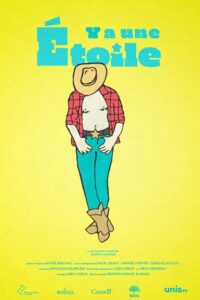
Generations of queer people from small villages and towns across the world have migrated to larger cities, looking for a more accepting community, more fun, better choice of partners and better career and cultural options. The same decision-making process, of course, applies to many straight people. But what if you’re queer and love rural living? High urban rents, improved societal acceptance of queer people and increased opportunities for remote working mean that many queer people are reconsidering rural living. Director Julien Cadieux examines this in Y a une etoile, (There’s a star), a unique documentary about rural queer life in the eastern French-Canadian provinces of Nova Scotia and New Brunswick. Part documentary, part musical, Cadieux combines interviews with a full spectrum of queer characters and their allies with music and musical performances. The songs featured are all by celebrated Acadian singer-songwriter Angele Arsenault whose music is all about openness, acceptance and being oneself. The tracks are performed by the interviewees – either sung, lip-synched or danced to in groups. Sounds random but, as the interviewees include drag queens, dancers, performers and other queer creative talents, the concept works. The film is also held together by stunning pastel-coloured cinematography.
 We first meet trans-man and musician Samuel Le Blanc who gives talks about his trans journey to local schools and colleges. His is an inspiring journey from confusion and unhappiness to fulfilment and acceptance. We follow him as he journeys through the countryside, variously by bike, car and hot air balloon – always in a pastel landscape – to meet other interviewees. These include drag queens, non-binary folk, a Two-Spirit queer indigenous trans-guy, a lesbian couple, trans men and women, and an asexual woman amongst others. It quickly becomes clear that rural living is definitely an option worth considering for queer people these days. Local communities are far more accepting than in previous generations, and career options are wider than in the past. The trick is to be more open-minded about who your chosen family contains. For example, drag queen Gabriel includes their mum in their drag family, and the two share clothes and hang out together in matching outfits. Patience with less informed neighbours is also necessary – a fabulously butch hairdresser on a quad bike mentions the attention can be quite zoo-like at times – for looks that might pass relatively unnoticed in a large city. The audiences for queer performances might not be as sophisticated as in the city – we see one drag performance given to members of an old people’s home, another in a village hall. The English speakers in this film have had it easier than the French speakers. For many years there simply weren’t as many words in French as in English to describe queer pronouns, sexuality and identity. We visit a fairground, a queer prom, a historical re-enactment site, a community centre and many other random places. What shines though is the level of acceptance and integration within the rural communities. Whilst many of the interviewees have been on the usual queer journey of acceptance, coming out, transition and so on, they have all ended up in a space they are comfortable with. And in these cases, it’s a rural space. Modern families.
We first meet trans-man and musician Samuel Le Blanc who gives talks about his trans journey to local schools and colleges. His is an inspiring journey from confusion and unhappiness to fulfilment and acceptance. We follow him as he journeys through the countryside, variously by bike, car and hot air balloon – always in a pastel landscape – to meet other interviewees. These include drag queens, non-binary folk, a Two-Spirit queer indigenous trans-guy, a lesbian couple, trans men and women, and an asexual woman amongst others. It quickly becomes clear that rural living is definitely an option worth considering for queer people these days. Local communities are far more accepting than in previous generations, and career options are wider than in the past. The trick is to be more open-minded about who your chosen family contains. For example, drag queen Gabriel includes their mum in their drag family, and the two share clothes and hang out together in matching outfits. Patience with less informed neighbours is also necessary – a fabulously butch hairdresser on a quad bike mentions the attention can be quite zoo-like at times – for looks that might pass relatively unnoticed in a large city. The audiences for queer performances might not be as sophisticated as in the city – we see one drag performance given to members of an old people’s home, another in a village hall. The English speakers in this film have had it easier than the French speakers. For many years there simply weren’t as many words in French as in English to describe queer pronouns, sexuality and identity. We visit a fairground, a queer prom, a historical re-enactment site, a community centre and many other random places. What shines though is the level of acceptance and integration within the rural communities. Whilst many of the interviewees have been on the usual queer journey of acceptance, coming out, transition and so on, they have all ended up in a space they are comfortable with. And in these cases, it’s a rural space. Modern families.
For future screenings https://www.facebook.com/YaUneEtoile/
Queerguru’s Contributing Editor Ris Fatah is a successful fashion/luxury business consultant (when he can be bothered) who divides and wastes his time between London and Ibiza. He is a lover of all things queer, feminist, and human rights in general. @ris.fatah

